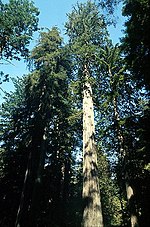If a tree falls in a forest and no one is around to hear it, does it make a sound?: Difference between revisions
Phoenixrod (talk | contribs) Undid revision 211468952 by 76.101.234.93 (talk) |
→References in culture: rv vanity-press spam per WP:SPS and WP:SPAM |
||
| Line 33: | Line 33: | ||
* In the [[Family Guy]] episode "[[The Son Also Draws]]", [[Peter Griffin]] asks the question to a bunch of talking trees while having a [[vision quest]]. |
* In the [[Family Guy]] episode "[[The Son Also Draws]]", [[Peter Griffin]] asks the question to a bunch of talking trees while having a [[vision quest]]. |
||
* In [[Monkey Island]] II: [[Lechuck's Revenge]], in the last chapter, Herman Toothrot asks Guybrush "If a tree falls and there is no one to see it fall, what color is the tree?". |
* In [[Monkey Island]] II: [[Lechuck's Revenge]], in the last chapter, Herman Toothrot asks Guybrush "If a tree falls and there is no one to see it fall, what color is the tree?". |
||
* If a man speaks in the forest and there is no woman there to hear it, is he still wrong? -- George Carlin |
* If a man speaks in the forest and there is no woman there to hear it, is he still wrong? -- George Carlin |
||
* In the episode, "Misty Mountain Top" of [[That 70s Show]], Kelso asks Hyde this question. |
* In the episode, "Misty Mountain Top" of [[That 70s Show]], Kelso asks Hyde this question. |
||
Revision as of 23:19, 22 May 2008
This section needs additional citations for verification. (March 2007) |

"If a tree falls in a forest and no one is around to hear it, does it make a sound?" is a philosophical riddle that raises questions regarding observation and knowledge of reality.
History
The origin of the question is unknown, but the current phrasing appears to have originated in the twentieth century. A 1910 physics book asks: "When a tree falls in a lonely forest, and no animal is near by to hear it, does it make a sound? Why?"[1]
Interpretations
The possibility of unperceived existence
Can something exist without being perceived? - e.g."Sound is only sound if a person hears it"
The most immediate philosophical topic that the riddle introduces involves the existence of the tree (and its sound) outside of human perception. If no one is around to see, hear, touch or smell the tree, how could its existence occur? What is it to say that it exists when such an existence avoids all knowing? George Berkeley in the 18th century developed subjective idealism, a metaphysical theory to respond to these questions, coined famously as "to be is to be perceived". Today metaphysicians are split. According to substance theory, a substance is distinct from its properties. According to bundle theory, an object is merely its sense data.
Knowledge of the unobserved world
Can we assume the unobserved world functions the same as the observed world? - e.g., "does observation affect outcome?"
A related question involves whether or not an unobserved event occurs predictably, like it occurs when it is observed. The anthropic principle suggests that the observer, just in its existence, may impose on the reality observed.
However, most people, as well as scientists, assume that the observer doesn't change whether the tree-fall causes a sound or not, but this is a difficult claim to prove.
The dissimilarity between sensation and reality
What is the difference between what something is, and how it appears? - e.g., "sound is the variation of pressure that propagates through matter as a wave"
Perhaps the most important topic the riddle offers is the division between perception of an object and how an object really is. If the tree exists outside of perception (as common sense would dictate), then it will produce sound waves. However, these sound waves will not actually sound like anything. Sound as it is mechanically understood will occur, but sound as it is understood by sensation will not occur.
This riddle illustrates John Locke's famous distinction between primary and secondary qualities. This distinction outlines which qualities are actually in an object, and which qualities are not. That is, a red thing is not really red, a sweet thing is not really sweet, a sound does not actually sound like anything, but a round object is actually round.
References in culture
This article contains a list of miscellaneous information. (October 2007) |
- "If a Tree Falls" is the title of one of Bruce Cockburn's most popular songs. The lyrics concern the loss of rainforests.[2]
- In a Dilbert comic strip, the pointy-haired boss asks "If a tree falls in a forest, and we've already sold the tree, does it still have quality?"
- This question was featured in the Simpsons episode "Dead Putting Society".
- In a cartoon of The Far Side, the question "If a tree falls in forest, and it hits a mime, does anyone care?", was posed, featuring an illustration of the scenario.
- In the Family Guy episode "The Son Also Draws", Peter Griffin asks the question to a bunch of talking trees while having a vision quest.
- In Monkey Island II: Lechuck's Revenge, in the last chapter, Herman Toothrot asks Guybrush "If a tree falls and there is no one to see it fall, what color is the tree?".
- If a man speaks in the forest and there is no woman there to hear it, is he still wrong? -- George Carlin
- In the episode, "Misty Mountain Top" of That 70s Show, Kelso asks Hyde this question.
See also
External links
References
- ^ Charles Riborg Mann, George Ransom Twiss, Physics (1910), p. 235.
- ^ Rounder Records - Bruce Cockburn - Big Circumstance - Album Detail
